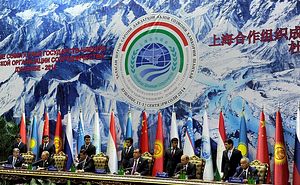China’s Foreign Minister Wang Yi called for the Shanghai Cooperation Organization (SCO) to take a larger role in guaranteeing regional security and stability during a meeting of SCO foreign ministers held in Moscow. The Shanghai Cooperation Organization is made up of China, Russia, and the Central Asian states of Kazakhstan, Kyrgyzstan, Tajikistan and Uzbekistan and is committed to fighting the “three evils”: terrorism, extremism, and separatism.
As Moritz Rudolf, Marc Julienne, and Johannes Buckow of MERICS pointed out in a recent piece for The Diplomat, the SCO is central to China’s international efforts to fight terrorism. In practice, however, the impact of the SCO has been limited to joint military drills and some intelligence sharing under the Regional Anti-Terrorist Structure (RATS). Still, China has ambitions for the grouping, which also has important implications for the success of China’s Silk Road Economic Belt. Ensuring security along the planned route will be crucial to reaching the full potential of a trade network stretching through restive regions in Central Asia, South Asia, and the Middle East.
Accordingly, Wang called for greater security cooperation among the SCO members, with a particular focus on ensuring stability in Afghanistan. Wang also encouraged more economic integration, a vision to be carried out through the Eurasian Economic Union and the Silk Road Economic Belt. In general, Wang said SCO members should extend “more support for each other” and work to “safeguard core interests.”
As China nudges the SCO to expand its capabilities, the organization is set to gain a prestige boost in another way: by adding new members. At the 2014 SCO Summit, held in Dushabe, Tajikistan, the organization finalized the process for adding new members, opening up the possibility the first-ever expansion of the group since it took its current form in 2001. India and Pakistan, both currently SCO observers, are expected to be the first new members. Iran, another observers, will likely look to join if the UN sanctions currently in place are lifted as part of a deal being negotiated to control Iran’s nuclear program.
Other observer states (and potential new members) include Afghanistan and Mongolia, with Belarus, Turkey, and Sri Lanka as dialogue partners. Yesterday, Russian President Vladimir Putin told the SCO foreign ministers that unnamed “other countries would like to strengthen their contacts with our organization.” Putin spoke of “partners from 12 countries … apart from the current members of the organization” as “showing interest” in the SCO.
Expanding the group will brings its own challenges, however, particularly if rivals India and Pakistan come on board. At the meeting, Wang stressed the need for greater unity among the SCO members, which will only become more challenging as new members join in.
The next SCO summit will take place in Ufa, the capital of the Republic of Bashkortostan in Russia, this July.

































